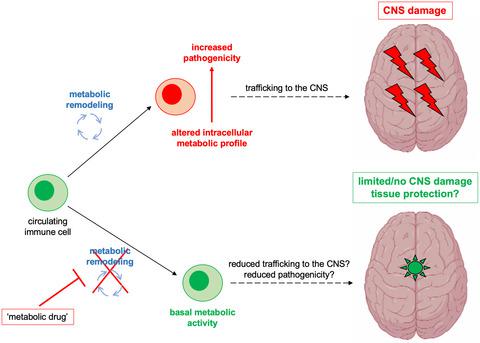当前位置:
X-MOL 学术
›
J. Neurochem.
›
论文详情
Our official English website, www.x-mol.net, welcomes your feedback! (Note: you will need to create a separate account there.)
Metabolic determinants of leukocyte pathogenicity in neurological diseases.
Journal of Neurochemistry ( IF 4.7 ) Pub Date : 2020-09-03 , DOI: 10.1111/jnc.15169 Marah C Runtsch 1 , Giovanni Ferrara 2 , Stefano Angiari 1
Journal of Neurochemistry ( IF 4.7 ) Pub Date : 2020-09-03 , DOI: 10.1111/jnc.15169 Marah C Runtsch 1 , Giovanni Ferrara 2 , Stefano Angiari 1
Affiliation

|
Neuroinflammatory and neurodegenerative diseases are characterized by the recruitment of circulating blood‐borne innate and adaptive immune cells into the central nervous system (CNS). These leukocytes sustain the detrimental response in the CNS by releasing pro‐inflammatory mediators that induce activation of local glial cells, blood–brain barrier (BBB) dysfunction, and neural cell death. However, infiltrating peripheral immune cells could also dampen CNS inflammation and support tissue repair. Recent advances in the field of immunometabolism demonstrate the importance of metabolic reprogramming for the activation and functionality of such innate and adaptive immune cell populations. In particular, an increasing body of evidence suggests that the activity of metabolites and metabolic enzymes could influence the pathogenic potential of immune cells during neuroinflammatory and neurodegenerative disorders. In this review, we discuss the role of intracellular metabolic cues in regulating leukocyte‐mediated CNS damage in Alzheimer's and Parkinson's disease, multiple sclerosis and stroke, highlighting the therapeutic potential of drugs targeting metabolic pathways for the treatment of neurological diseases.
中文翻译:

神经系统疾病中白细胞致病性的代谢决定因素。
神经炎症和神经退行性疾病的特征是将循环血源性先天性和适应性免疫细胞募集到中枢神经系统 (CNS) 中。这些白细胞通过释放诱导局部神经胶质细胞活化、血脑屏障 (BBB) 功能障碍和神经细胞死亡的促炎介质来维持中枢神经系统的有害反应。然而,浸润外周免疫细胞也可以抑制中枢神经系统炎症并支持组织修复。免疫代谢领域的最新进展证明了代谢重编程对于这种先天性和适应性免疫细胞群的激活和功能的重要性。特别是,越来越多的证据表明,代谢物和代谢酶的活性可能会影响免疫细胞在神经炎症和神经退行性疾病期间的致病潜力。在这篇综述中,我们讨论了细胞内代谢线索在调节白细胞介导的中枢神经系统损伤中的作用,在阿尔茨海默病和帕金森病、多发性硬化症和中风中,强调了针对代谢途径的药物治疗神经系统疾病的治疗潜力。
更新日期:2020-09-22
中文翻译:

神经系统疾病中白细胞致病性的代谢决定因素。
神经炎症和神经退行性疾病的特征是将循环血源性先天性和适应性免疫细胞募集到中枢神经系统 (CNS) 中。这些白细胞通过释放诱导局部神经胶质细胞活化、血脑屏障 (BBB) 功能障碍和神经细胞死亡的促炎介质来维持中枢神经系统的有害反应。然而,浸润外周免疫细胞也可以抑制中枢神经系统炎症并支持组织修复。免疫代谢领域的最新进展证明了代谢重编程对于这种先天性和适应性免疫细胞群的激活和功能的重要性。特别是,越来越多的证据表明,代谢物和代谢酶的活性可能会影响免疫细胞在神经炎症和神经退行性疾病期间的致病潜力。在这篇综述中,我们讨论了细胞内代谢线索在调节白细胞介导的中枢神经系统损伤中的作用,在阿尔茨海默病和帕金森病、多发性硬化症和中风中,强调了针对代谢途径的药物治疗神经系统疾病的治疗潜力。


























 京公网安备 11010802027423号
京公网安备 11010802027423号